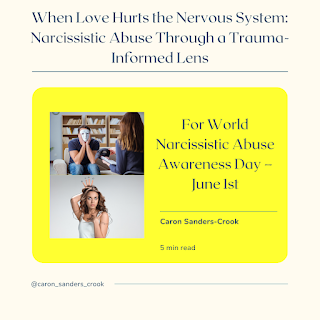When Love Hurts the Nervous System: Narcissistic Abuse Through a Trauma-Informed Lens
When Love Hurts the Nervous System: Narcissistic Abuse
Through a Trauma-Informed Lens
For World Narcissistic Abuse Awareness Day – June 1st
We often hear that love is patient, kind, and safe. But for
many, love has also been confusing, consuming, and deeply unsafe. On World
Narcissistic Abuse Awareness Day, we pause to honour those whose lives have
been silently shaped by the invisible bruises of emotional manipulation and
chronic control.
This kind of abuse doesn't always leave visible scars. But
it leaves deep, neurological imprints, especially on the nervous system.
What Is Narcissistic Abuse?
Narcissistic abuse isn’t simply about being with someone
who’s self-absorbed or vain. It's a form of emotional and psychological
abuse inflicted by someone exhibiting narcissistic personality traits or
full-blown Narcissistic Personality Disorder (NPD).
At its core, narcissistic abuse is about control,
exploitation, and eroding your sense of self, often so subtly that you
begin to question your own reality.
These relationships can occur in romantic partnerships,
parent-child dynamics, workplace settings, and even friendships. But they all
share a common thread: the steady destabilisation of the other person’s
autonomy and worth.
The Nervous System Doesn’t Lie
Our bodies are exquisitely wired to detect safety. But in an
abusive dynamic, the nervous system often gets caught in a chronic state of
dysregulation.
Here’s how narcissistic abuse can impact your nervous
system:
- Hypervigilance
(Fight/Flight): You may constantly scan for signs of anger, mood
swings, or cold withdrawal. Even silence feels dangerous.
- Fawning
(Appease): To keep the peace, you over-accommodate, self-abandon, and
suppress your needs. This becomes your survival strategy.
- Freeze
Response: You may become emotionally numb or dissociate in moments of
intense confusion, gaslighting, or verbal attacks.
- Exhaustion
and Collapse: The long-term wear and tear on your nervous system can
lead to autoimmune flare-ups, chronic fatigue, anxiety, or complex PTSD.
What makes narcissistic abuse particularly insidious is that
it’s intermittent. The cycle of love-bombing and devaluation keeps the
nervous system locked in hope and fear, reward and punishment—an emotional
rollercoaster that mimics addiction.
Signs You May Be in a Relationship with Someone Showing
Narcissistic Traits
These signs can be subtle, especially in the early stages.
But here are trauma-informed red flags to watch for:
1. You feel confused, often.
They say one thing and do another. Your gut says something’s
wrong, but they twist the narrative so you question yourself.
2. They lack empathy.
When you express pain or vulnerability, they seem annoyed,
dismissive, or even amused. Your feelings are often minimised or ridiculed.
3. You’re constantly apologising.
Even when you don’t know what you’ve done wrong, you find
yourself apologising just to soothe the situation.
4. You feel like you’re walking on eggshells.
You try to anticipate their moods, reactions, or needs. You
overthink your words or actions to avoid a blow-up or silent treatment.
5. They love-bomb, then devalue.
They once idealised you, but now they criticise, compare, or
ignore you. Yet every so often, they turn on the charm again.
6. They isolate you from support.
You might feel cut off from friends, family, or even your
sense of self. They plant doubts about your support system—or convince you
they’re all you need.
7. Your nervous system feels constantly on edge.
Even in calm moments, your body doesn’t relax. You’re
waiting for the next shift in the weather.
Healing Begins with Awareness
World Narcissistic Abuse Awareness Day isn’t just about
recognising others’ pain; it’s also about recognising your own.
If this resonates with you, please know:
- You
are not too sensitive.
- You
are not to blame.
- You
are not alone.
Healing begins by gently tuning back into your body’s
signals. It’s learning to trust your nervous system again and to create safety
from the inside out.
Trauma-Informed Tips for Moving Forward:
- Name
what’s happening. Label the patterns. It helps bring clarity and
coherence to your experience.
- Ground
yourself regularly. Breathwork, somatic movement, and sensory
grounding can soothe your nervous system and rebuild internal safety.
- Seek
trauma-informed support. Working with a practitioner who understands
narcissistic abuse and nervous system repair is vital.
- Reconnect with safe people. Isolation breeds confusion. Support breeds clarity.
You deserve a life where love is safe. Where your nervous
system doesn’t need to brace for impact. Where you don’t have to shrink to stay
connected.
Let this June 1st be a turning point.
A day you name what’s happened.
A day you reclaim your truth.
A day your healing begins, not in fear, but in fierce self-compassion.
If you or someone you love is experiencing narcissistic
abuse, help is available.
Reach out to a trauma-informed therapist, support group, or helpline. You are
not alone, and you never have to walk this path unsupported.
With lived understanding, clinical insight, and deep
compassion, Caron 💜
.png)

.png)

Comments
Post a Comment